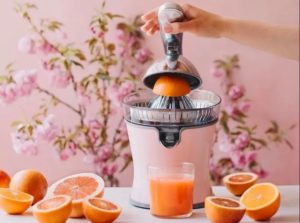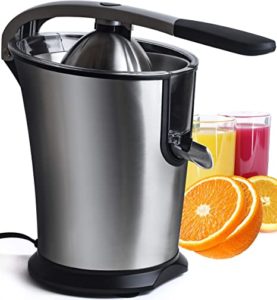Before you continue, I’d like to tell you about a fantastic juice cleanser company with which I’ve begun collaborating with Chef V. Their 21-day juice-based cleanser helped clients lose 40 pounds! If you’re interested in losing weight, I recommend ordering a cleanse from their website.
There is no comparison between freshly squeezed orange juice and store-bought orange juice, but do you know what makes newly squeezed orange juice even more delicious?
When the best oranges are available for juicing.
Valencia oranges are the three best oranges for juicing because they are in season nearly the entire year. Navel oranges, because they lack seeds, and blood oranges, which contain the most antioxidants, are the healthiest citrus fruits.
Some oranges are best for eating, while others are best for cooking, but the best oranges for juicing are juicy, sweet, and have few seeds.
Regarding seeds, what are our intentions for them?
Should Orange Peel and Seeds Be Included?
If you’re crushing your orange juice, leave the peel on because it won’t go into the liquid. However, if you’re using a juicing machine, you’ll want to peel it before you juice it.
Orange peel can impart a bitter flavor to orange juice, and peeling it eliminates the need to wash it, saving you time.
The seeds of orange, on the other hand, contain limonene, which, when exposed to air, causes the orange juice to taste bitter. Therefore, remove as many seeds as possible if you intend to make orange juice with a juicer.
In a citrus press, the seeds are captured in the pulp catcher and neither crushed nor added to the beverage.
Additionally, limonene is present in the flesh of navel oranges, but we will discuss that later.
3 Best Oranges For Juicing
Here are the three best oranges for making freshly squeezed orange juice. I have a few others, but if you stick to these three, you’ll be in good shape. I’ve also included when they’re in season to obtain the freshest; most flavorful produce possible for an even more robust flavor. And these were chosen to assume you already possess the best orange juicer, allowing you to obtain the highest quality orange juice possible. Now let’s examine the best orange variety for making fresh orange juice at home.
Valencia Oranges
Valencia oranges are hardy, year-round, with a sweet flavor, abundant juice, and typically no more than nine seeds. They are used to make most commercial orange juices and are in season from April to December.
So you only have January to March when you cannot obtain Valencia oranges that are fresh and in season. In addition, there are midnight Valencia’s, a seedless variety that is less common.
During the sizzling summer months, Valencia oranges may regreen when the peel turns slightly green to protect the fruit from sunburn. Do not be fooled; these oranges are still ripe and delicious; they don’t lose any juice or flavor; they change color on the outside. Simply put, the orange juice will taste identical.
Navel Oranges
As previously stated, navel oranges contain limonene in their flesh rather than their seeds, making them a popular choice for home juicing.
This means that as soon as you juice them, they become bitter. It takes a few hours before you notice, but it also means that they are only suitable for juicing and drinking immediately; you cannot make large quantities of juice and store it in the refrigerator or freezer.
But the primary advantage of Navel oranges is that they are seedless, so you can juice them without removing the seeds, and they work well in a juicer.
Nonetheless, navel orange juice is among the best that can be made. They are in season from December to April, thus covering the Valencia orange’s off-season.
Blood Orange
Blood oranges are the healthiest juice because they contain the most antioxidants and are visually appealing.
Blood orange juice, which is ripe from mid-January to April, has a fresh, spicy orange flavor and an aroma that is unique among oranges. While blood oranges aren’t the cheapest, they make the most enjoyable juice and are a terrific addition to other orange and citrus varieties.
Not your typical orange for juicing, but one worth trying.
Benefits of Orange Juice to Health
Or I should say homemade orange juice because the difference between homemade and store-bought orange juice can be as stark as chalk and cheese.
Even the expensive organic store stuff has been preserved and bottled, so making your own is preferable.
Bottled orange juice is preserved by adding chemicals or pasteurizing orange juice, which destroys any healthy enzymes that may be present. It may also contain added sugar and possibly additional flavorings you do not wish to consume.
This leaves you with all the enzymes and antioxidants, such as vitamin C, which is excellent for your immune system, as you are undoubtedly aware.
However, did you know it also protects the skin from UV damage? Perfect for summer or the warmer southern states
Advice For Preparing Orange Juice
I have a separate article on making freshly squeezed orange juice, which you should check out, but I also wanted to share a few of the most important tips here.
Add pulp After: It depends on the type of juicer you’re using, but it’s best to juice it until it’s smooth and catches all the pulp; then, if you enjoy the pulp, you can add it in after the juice has been prepared. Remember that it is easier to add the pulp to fresh orange juice than to remove it, so stir the pulp sparingly before adding more.
Peel It With A Knife: If you put your orange in a juicer, peel it with a knife instead of your hands. This ensures that all the white pith, which contains no juice and creates a mess inside the machine, is removed.
To accomplish this, halve the orange and place it flesh-side down on the chopping board. Next, make minor cuts near the top down to the counter, following the orange curve, and remove the lid.
Drink Immediately: It’s suitable for about a day, mainly if you’ve used Valencia oranges, but if you’ve used an orange juicer like the one, I recommend, your juice will keep in the refrigerator for two to three days. Alternatively, orange juice can be frozen and stored for three to six months. However, the sooner you consume it, the better it will be.
Other famous Orange You Can Juice varieties.
The three orange varieties listed above are the most popular for juicing, but you can also try the following varieties.
Tangerines
These miniature oranges are generally suitable for those who cannot stomach a regular orange. If you have difficulty digesting regular oranges, juicing tangerines will be ideal.
Tangerines contain more usable vitamin C than oranges, which is amusing! Therefore, tangerines are an excellent choice if you’re looking to strengthen your immune system.
They have a slightly sweeter and tangier flavor and should be stored in the refrigerator to maintain their freshness. Christmas oranges are available from November to January, hence their name.
Clementine Oranges
Clementine oranges are a minor type of fresh orange; therefore, they are not ideal for juicing because you must juice so many of them to obtain freshly squeezed orange juice. However, they are sweet oranges so the sweet flavor can be genuinely exceptional despite the additional effort.
Clementines are seedless, so you don’t have to exert much effort to put them through a juicer. Ideal for use with an orange juicer.
This winter, orange juice is available from November to April, making it a fantastic option.
Mandarin Oranges
Mandarins are a bit larger and have a milder flavor, but they are straightforward to peel, making them ideal for juicing machines.
The mild flavor is an excellent choice if you’re attempting to please everyone. Seasonal from November to April
Satsuma oranges
They are not as sweet as mandarins, but their citrus flavor can be interesting. The funniest is juicing all the different orange varieties simultaneously and attempting to distinguish between them.
Regardless of your choice, they are an excellent way to bring some Florida sunshine into your home.
In season from mid-November to February, Satsuma oranges are not among the best oranges for juicing due to their small size, but if you only have them, feel free to juice them. Still, they produce delicious juice.
Conclusion Regarding the Top Juicing Oranges
In my mind, the Valencia orange remains the best orange for juice production. It’s the juiciest and most readily available, but don’t be afraid to experiment. Get whatever oranges are available in your area and try them.
Blood oranges produce orange juice with a unique color and flavor; they are, therefore, worth trying. I hope you enjoy whatever fresh orange juice you decide to make. Orange juice is fun and delicious, especially when made from fresh oranges.
Not all oranges are suitable for juicing. Seville oranges are sour and do not produce pleasant juice. They are much more ideal for marmalade. Remember that oranges can be eaten fresh in addition to being juiced. The most popular orange juice is made from oranges with the highest sugar content, but a slightly sour taste can be exceptionally delicious and unique. A few tangerines or tangelos can go a long way toward creating a distinctive juice.
Related Posts
Best orange juicer for energy every morning
Disclaimer: There are affiliate links in this post. At no...
Read MoreBest Electric Citrus Juicer For Every Budget
Disclaimer: There are affiliate links in this post. At no...
Read MoreBest Citrus Juicer For Every Purpose
Disclaimer: There are affiliate links in this post. At no...
Read MoreWhy Trust Us
You will find what you are looking for at dulceriabakery. From classic to luxury brands, you'll find both. We will help you to select appliances that fit your needs, budget and lifestyle. Whether you want to stop by to learn more — or plan to make a major purchase — we’ll treat you like family and assist you every step of the way. Shop with us today to receive friendly and experienced help along the way.



